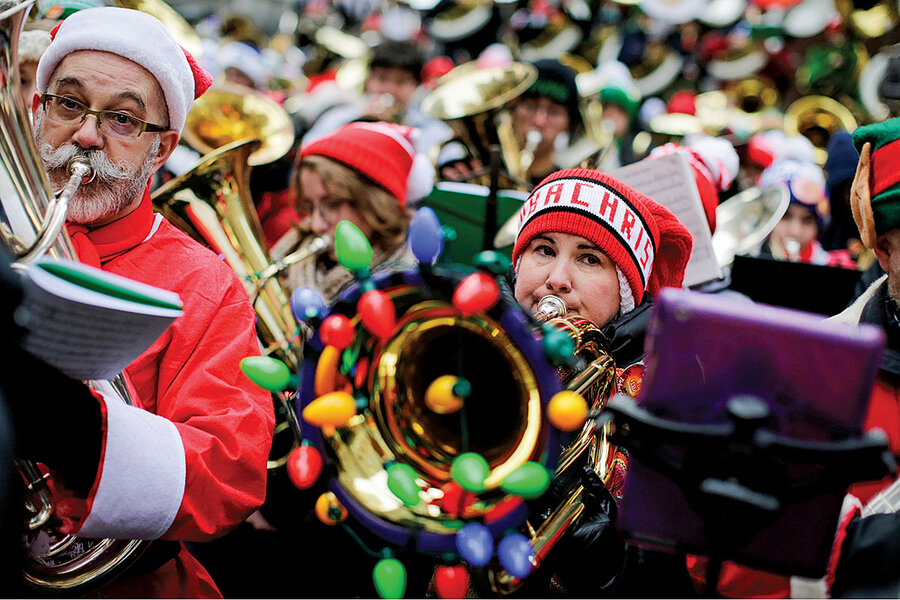I’m blatted into Christmas past by tubas
Loading...
It’s December in Portland, Oregon; it’s dumping rain. There are more than 200 tuba players there, scavenged from all over town. We watch as a gray-haired man is installed on the dais to conduct. He is revered by the musicians, many of whom he has taught, and they smile at him with love and embarrassment.
And we citizens of Portland stand in the downpour, our shoes filling with water, screaming inside, tuba-tuba-tuba! We smile in his direction until, finally, he totters around to face the players, slowly lifts his arms, and releases the tubas. There are virtuosos, but it is not the nimblest of instruments, and a large and democratic volunteer force is best reined in at a safer speed. Still, they are magnificent, even while lumbering through “Joy to the World,” even if “Deck the Halls” is done as a dirge.
When the tubas break out in the most magnificent hymn of all, a hymn with the majesty to match the tempo, there’s a moment in it: the soaring “Come and behold him, born the king of angels,” the measure where your voice and your heart both break at once. That’s your childhood shining through the fracture. It’s OK to weep for it.
Why We Wrote This
“There was a time, long ago, when we knew all about Christmas. We were small; we held it right in our hearts,” essayist Murr Brewster writes. “We have to work at it to find Christmas now, but it’s worth looking for.” For her, that means Tuba Christmas.
There was a time, long ago, when we knew all about Christmas. We were small; we held it right in our hearts. It had something to do with our childhood advent calendar with the little doors opening one by one, the choirs with candles, the green plush dinosaur under the tree, the eyes springing open at dawn. But familiarity dimmed our anticipation long ago. And bit by bit, obligation buried our spirit. We’re all grown up. We have to work at it to find Christmas now, but it’s worth looking for.
What we really want is not the plush green dinosaur, but the heart that can barely contain the joy of it. What we really want is to be flanneled and folded in Mommy’s lap, knowing her heart can barely contain the joy of it. What we really want is not at the mall, but if you know where to look, you can get enough to go on. Music is a good start. It’s why we go to “Tuba Christmas.”
That’s outdoors in the square downtown. It’s December in Portland, Oregon; it’s dumping rain. There are more than 200 tuba players of all ages there, scavenged from all over town and corralled under a canopy. We watch as, with some difficulty, a gray-haired man is installed on the dais to conduct. He is revered by the musicians, many of whom he has taught, and they smile at him with love and embarrassment. This is the highlight of his year, and he wants to talk. He wants to talk a lot, to teach some more, and to crack wise with comic timing honed in the 19th century, the punchline expected later in the month when the stagecoach comes through.
Why We Wrote This
“There was a time, long ago, when we knew all about Christmas. We were small; we held it right in our hearts,” essayist Murr Brewster writes. “We have to work at it to find Christmas now, but it’s worth looking for.” For her, that means Tuba Christmas.
And we citizens of Portland stand in the downpour, our shoes filling with water, screaming inside, tuba-tuba-tuba! We smile in his direction until, finally, he totters around to face the players, slowly lifts his arms, and releases the tubas. There are virtuosos, but it is not the nimblest of instruments, and a large and democratic volunteer force of them is best reined in at a safer speed. Still, they are magnificent, even while lumbering through “Joy to the World,” even if “Deck the Halls” is done as a dirge.
There’s an attempt to get the crowd to sing along, only they want us to do it a cappella, our verse framed but not accompanied by tubas. The conductor is under the canopy and hard to see from the topmost seats, and the pace the tubas have set for us is glacial. The angels we could hear on high, who couldn’t see the conductor at all, had to wing it. Other factions selected their own paces according to how cold they were, and by the time heav’n and nature sing, the group closest to the conductor has been lapped twice.
There was nothing professional about it, any of it, and when the conductor remembered an interesting historical footnote and laboriously turned around to inform us of it, I looked back at the audience: every one of us wet as muskrats, children stomping puddles as quietly and decorously as possible. You could try to think of rain as God’s tinsel if you want, but it’s cold, and hard to feel festive about it. Yet everybody is smiling patiently, jiggling for heat, because not one would deny a kindness to an old tuba player at the close of his career. It’s the bookend to our first Christmases, and it’s what we have to give.
And when the tubas break out in the most magnificent hymn of all, a hymn with the majesty to match the tempo, there’s a moment in it: the soaring “Come and behold him, born the king of angels,” the measure where your voice and your heart both break at once. That’s your childhood shining through the fracture. It’s OK to weep for it.







